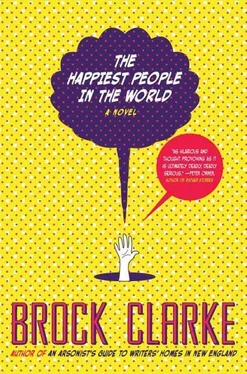Henry resumed walking. Past the Nice n’ Easy. Past the fairgrounds. Just ahead was Bonny Courts, a subdivision between the fairgrounds and the school. At the entrance of the subdivision was a wooden sign carved into the shape of a castle, and behind the sign was a fiberglass statue of, for some reason, a brown bear, eight feet high on its hind legs, its front paws held palms-out. The effect was probably intended to be menacing — Don’t enter here unless you live here! the bear probably wanted to be saying with its paws — but to Henry, the gesture seemed full of joy, like the bear was on the top deck of a cruiseship, saying, Good-bye! Good-bye! to the nice people on the pier below. Anyway, Henry was ten feet from the bear when he saw a boy on a skateboard careen out of the subdivision and onto the sidewalk. It was Kurt. Henry knew this because Kurt was the only person who rode a skateboard in Broomeville. The skateboard was a large wooden thing, so wide that you wouldn’t think anyone could fall off it. But once on the sidewalk, Kurt attempted some sort of hopping maneuver and in doing so lost his balance and struck his head on the castle, and his skateboard shot forward at an incredible speed, hopped off the sidewalk, and sailed across the road and into a ditch. Kurt rolled around on the ground for a few seconds, then made a loud animal sound, then pulled himself into a sitting position, head between his knees. “Fuck!” he yelled, three times, and then suddenly he got to his feet, sprinted to his skateboard, picked it up, and then sprinted back toward the sign, with the obvious intent of beating the castle with his board, but before he got close enough to the castle to beat it, he slipped and fell, striking the back of his head on the sidewalk. He was still lying there when Henry reached him.
“Ouch,” Henry said. Kurt opened one eye, saw who it was standing over him, closed the eye again.
“Where’s my skateboard?” Kurt said, even though it was still in his right hand.
“You might be hurt,” Henry said.
“Or I might be. .,” Kurt said, but he didn’t finish the sentence. Instead he sat up, and Henry got a good whiff of what Kurt might be. Oh, buddy, he thought but did not say. “. . High,” Kurt said, finishing the sentence.
“You do smell high,” Henry said.
“Please don’t tell my father,” Kurt said.
“Does that mean I can tell your mother?” Henry said. Although he had no intention of telling anyone anything. He was not a psychiatrist or a doctor, and even less a lawyer or a priest, and in any case he had taken no oath of patient-counselor confidentiality. But that was one of his policies, unwritten and unspoken but by now well known: if a student told him something and did not want Henry to pass the information on to the student’s parents or teachers or whomever, then Henry would not. Usually, if a student felt bad enough about something that he confessed to it and then asked Henry to keep the information secret, then the student would end up either spilling the beans himself or he would just stop doing it.
“I guess not,” Kurt said, and then he started crying. Crying and crying. The kind of crying where you didn’t care who sees or hears. Lots of people were seeing and hearing, too: buses, cars, pedestrians, passed by and gawked, and still Kurt wept. The public weeping produced a great feeling of residual Scandinavian embarrassment in Henry, and at first he began hugging Kurt in an attempt to just get him to stop crying in the presence of all these other people. But Kurt did not stop, he kept weeping, and suddenly Henry had an image of the near future. In two days, Ellen and Henry would be married. They had transformed the four apartments above the Lumber Lodge into a home: a television room, a kitchen, a bathroom in the hall, a master bedroom for Henry and Ellen, and a bedroom for Kurt. Kurt had not yet moved into the bedroom: Ellen had felt very strongly that he not do so until she and Henry were legally wed. But anyway, Henry had a vision of the room in the near future, and in it there were posters on the wall, dirty socks everywhere, and also, of course, a bed, and on the bed Kurt was weeping, and Henry was hugging him and telling him that everything was going to be just fine, just like a real father would tell his real son, except if that were true, then why in the middle of the night was the real son sliding a piece of paper under the real father’s door with the real father’s real name on it, crossed out with a big black X ?
Henry went to break their embrace, but Kurt had already done so. He wasn’t crying anymore. Instead he was looking at Henry the way Henry had been planning to look at him, eyes wide open. I think I know what you did, the look said. I think I know who you are.
Please don’t tell your mother, Henry thought but did not say, because he was afraid to say anything, and also because Kurt had already remounted his skateboard. “I wonder if the stranger will show up again today,” he said, and then he skateboarded off.
Three thirty, Thursday afternoon. Matty was in his office. The school buses had left; the stranger had not arrived. Matty had been thinking about him all day. Matty felt that his reappearance was somehow key to stopping Ellen from marrying Henry in two days. Two days, two days. Then, two knocks on the door. “Come in,” Matty said, but his secretary, Gina, was already coming in. Gina was a small woman, always armed with small yellow sticky notes. She was holding one now.
“I just got a call from accounting,” she said.
“Huh,” Matty said. They were always getting calls from the state education board’s accounting office. Usually they wanted to know why the school had bought the second-cheapest kind of volleyball instead of the cheapest, why they’d purchased two sacks of rock salt instead of just one, etc. Matty extended his hand, and Gina gave him the note. On it was a bunch of numbers.
“And this is. .”
“A telephone number,” Gina said. “In Denmark.”
“OK.”
“You called it from your office phone.”
“I did not,” Matty said, but his mind was already at work, asking who, why, and of course when. “When?”
“Last night,” Gina said. “A little after eleven.”
Eleven o’clock the night before. Matty had been home, in the kitchen, next to the woodstove, watching TV. Kurt had been there, too, if Matty was looking for an alibi. But he wasn’t, necessarily, and he wasn’t necessarily worried about accounting, either. All accounting wanted was for you to be aware that they knew what you were doing, and to not do it again.
“Huh,” Matty said. “And what else did accounting say?”
“They said don’t do it again.”
“Don’t do what again?” Ellen said. She was behind Gina, and as soon as Gina heard her voice, she exited the scene, the way you do when the boss’s ex-wife enters. Ellen entered. It felt illicit to have Ellen in his office, alone. Matty had to stop himself from saying something ridiculous, something like, I want to start our life together again, right now. Instead, Matty gestured for her to sit in the empty red plastic chair to the left of the door. Ellen shook her head, then leaned against the wall, left eyebrow raised (which she’d always done), arms crossed, frowning (which she had never done). She must have picked it up from Henry. Ellen was close enough for Matty to smell her cigarette-smoke smell if she’d smelled of smoke, which she didn’t. Henry had probably made her quit. No, Henry never made anyone do anything. But he’d probably helped her quit. Henry, Henry. Two days, two days. In two days, Ellen would be married to Henry, but only if Matty couldn’t help it.
“Don’t do what again?” Ellen asked a second time.
Читать дальше












